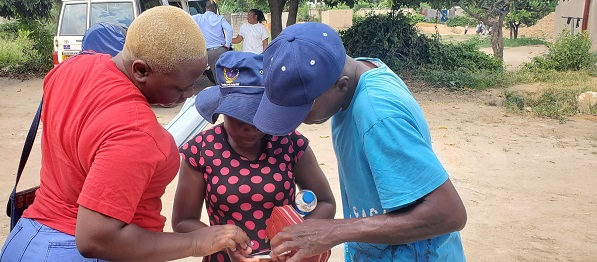
The Sunday Mail

Theseus Shambare
THE bustling streets of Harare’s central business district (CBD) present a daunting challenge for Brian Chakudzwa and his wife, Tembeni, who both have hearing impairments.
At one point, struggling to secure transportation back to their home in Epworth, they were met with rejection at every turn.
Frustration etched across their faces, as they could not comprehend why they were being denied entry into any of the commuter omnibuses.
Hope seemed to fade away, but a ray of compassion emerged when a young woman in her 30s stepped in to assist.
The young lady, Patience Nhemachena, patiently interpreted their predicament.
“They paid with a US$5 note when they were coming into the city centre,” she explained.
“They received their change, three US$1 notes and the remaining US$1 in local currency notes. Now, following the introduction of the ZiG currency, some people are refusing to accept the old currency notes.”
As a result, the couple could not pay for transport using the old local currency notes, but some Good Samaritans assisted by paying for their fare.
This plight is all too familiar for persons with disabilities (PWDs), who often face exclusion and numerous other barriers in society.
Recognising the urgent need to bridge this gap, Signs of Hope Trust (SOHT) and the Media Institute of Southern Africa – Zimbabwe (MISA Zimbabwe) have joined forces to conduct awareness programmes for persons with disabilities, ensuring they are no longer left behind.
During one of these programmes, participants voiced their struggle to access vital information, highlighting the prevalence of misinformation within their communities.
Mr Cherechedzai Makaza, who has a hearing impairment, emphasised the challenges faced by sign language users.
“To us, news of the new currency is nothing more than hearsay,” he lamented. “We rely on others to relay information, often distorted by their interpretation.”
Language barriers have also proven to be a significant hurdle in engaging with outreach programmes, such as national budget consultations.
Mr Makaza expressed his willingness to participate, but the lack of sign language proficiency among the general population gets in the way of meaningful dialogue.
“We find it difficult to voice our opinions,” he added.
Mr Phineas Mapfunde, who relies on a wheelchair, shares similar frustrations.
Limited mobility impedes his access to accurate information.
When consultations or awareness campaigns take place without his helper, or when the topic does not interest the helper, Mr Mapfunde is left uninformed.
He relies on secondary information, which is often unreliable.
Last year, he even missed out on voting during the elections, due to false information he received about his preferred candidate’s removal from the ballot.
Mrs Rosemary Mupfumbi highlighted that the inability to embrace new information and communication technology (ICT) tools has worsened the situation.
“Nowadays, information circulates through digital platforms, easily accessible from the comfort of our homes,” she said.
“However, many of us cannot afford such devices, which further isolates us. A few who got them, also sometimes get false information, which sometimes is misleading.”
To address these issues, the training provided during these programmes equips PWDs with fact-checking skills, and the ability to discern between fake and real news.
MISA Zimbabwe project officer Ms Nonhlanhla Ngwenya, stressed the importance of protecting PWDs from misinformation.
“Individuals with disabilities are just as susceptible to information disorders as anyone else, if not more,” she warned.
“Limited access to technology and reliable internet sources, as well as potential social isolation, make it harder for them to obtain diverse and accurate information.”
Ms Rita Matongo, the monitoring and evaluation officer at SOHT, emphasised the critical need for credible information for PWDs.
“Our outreach programs aim to provide safe and verified information that PWDs can rely on daily,” she said.
SOHT director Ms Samantha Sibanda called on the Government to adopt a more inclusive approach.
“Persons with disabilities are currently residing in an information desert, vulnerable due to limited access to ICTs and high data charges,” she said.
“Government entities and communication service providers have a crucial role to play in disseminating accessible information and unpacking complex documents for the general population.”
As internet usage surges, the digital landscape is marred by fake news, cyber-bullying, hate speech, and the spread of misinformation.
Persons with disabilities are disproportionately affected by these issues, grappling with limited access to online information.
In the journey towards equality and empowerment, PWDS must be equipped with accurate information, enabling them to make informed decisions, protect themselves from manipulation, and actively participate in civic life.
X: @TheseusShambare



